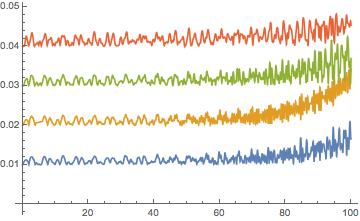I am trying to simulate a multiple pendulum system with damping as follows:
l = 0.6 (1 + 0.00 I); g = 9.8;
x0 = 0.01;
coord[n_] := Table[Subscript[x, i][t], {i, n}];
vel[n_] := D[coord[n], t];
mass[1] = {x0 Cos[\[Omega] t], 0};
mass[i_] :=
mass[i - 1] + {l Sin[Subscript[x, i - 1][t]], -l Cos[
Subscript[x, i - 1][t]]};
ke[i_] := With[{v = D[mass[i + 1], t]}, v.v/2];
pe[i_] := g mass[i + 1][[2]];
L[n_] := Sum[ke[i] - pe[i], {i, n}];
eq[n_] :=
Table[D[D[L[n], vel[n][[m]]], t] - D[L[n], coord[n][[m]]] == 0, {m,
n}];
ic[n_] :=
Table[{Subscript[x, i][0] == 0, Subscript[x, i]'[0] == 0}, {i, n}] //
Flatten;
So that eq[n] is the Lagrangian equation of motion for n linked pendula. Now I can get a solution with
SOL[n_] :=
NDSolve[{FullSimplify[eq[n]] /. \[Omega] -> 1, ic[n]} // Flatten,
Table[Subscript[x, i][t], {i, n}], {t, 0, 100},
Method -> {"EquationSimplification" -> "Residual"}]
(try for instance f=SOL[4]). However if I add a little bit of damping by changing l=0.6(1+0.01I), the solver fails with the error
NDSolve::icfail: Unable to find initial conditions that satisfy the residual function within specified tolerances. Try giving initial conditions for both values and derivatives of the functions. >>
So my question is whether there is some method available to NDSolve that I can call to make this work for complex variables.


l=0.6(1+0.01I)to make l complex. currently trying your solution with that replacement, it's taking a while. $\endgroup$Solvestep with a symbolicl(Clear[l]). Then substitutel -> 0.6(1+0.01I). The approximate real numbers are boggingSolvedown. $\endgroup$